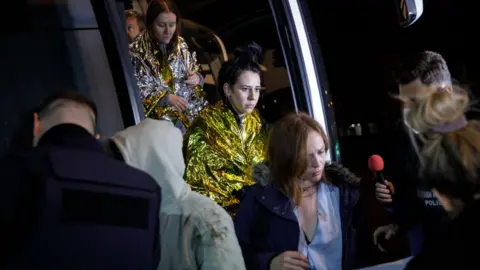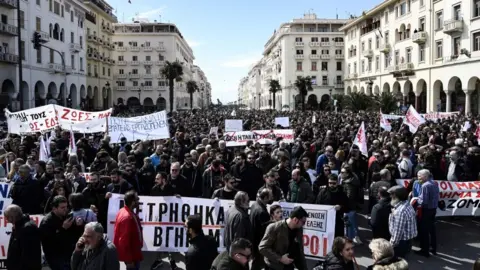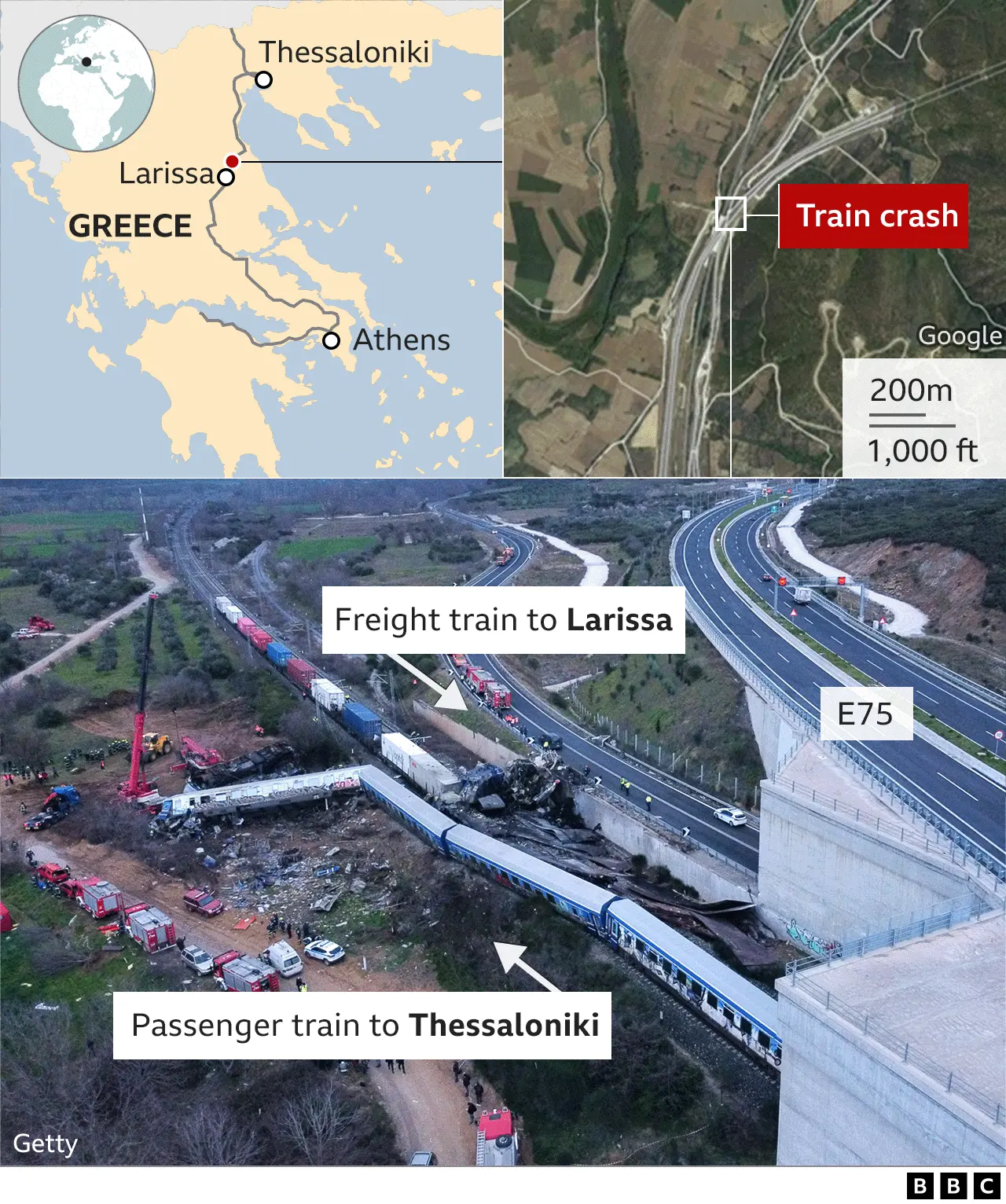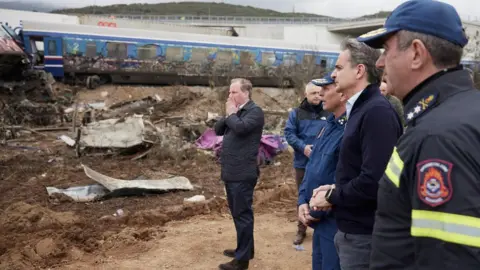Greece train crash: Rage at elite over young victims of rail tragedy
 Giorgos Christides
Giorgos ChristidesThe last time I saw Dimitra Kapetaniou was when my four-year-old labrador spotted her, pulled me towards her and jumped up on her for a big hug. She lived across the street with her parents and her dog, Freddie, and she graduated last June with a degree in pre-school education.
She was one of 57 confirmed victims in Greece's worst-ever rail disaster and like many of them she was a student.
This tragedy has shaken Greece. So many of the lives lost were young and it has unleashed a national outpouring of grief and outrage mostly directed against the country's ruling classes. Not for the first time, Greeks feel betrayed by their politicians.
Dimitra had boarded the train in Volos on the coast after finishing her postgrad class, and was inside one of the front carriages of the passenger train carrying some 350 people from Athens to Thessaloniki.
Not long afterwards the train was diverted by mistake on to the same track as an oncoming goods train. The two trains collided head-on, at speeds approaching 160km/h. Dimitra's death was confirmed by matching her DNA with her mother, Christina.
The direct cause of this disaster may have been human error. But it would have been averted had Greece not grossly neglected such a core part of its critical infrastructure. The rail network has suffered from years of underinvestment and neglect, and Greece's prolonged debt crisis is only part of the story.
 Getty Images
Getty ImagesDimitra was well loved in my neighbourhood in Thessaloniki. A slender young woman with long, curly hair she always had a huge smile. She had worked as a dog-sitter during her studies and my dog, Roman, had spent countless days at her house, often on her bed.
She was one of three people who died in the crash just from this small neighbourhood. A fourth victim was seriously injured but survived.
Kelly Porfyridou, 23, was a theology student who died with her boyfriend Nikitas Karatheodorou, also 23. He was a fireman whose colleagues said was on his way to visit his parents in Thessaloniki. Their joint funeral took place in my suburb a few days ago.
When I walk my dog, go to the bakery, the butcher's or the kiosk, the conversation turns invariably to the train wreck and it often ends in tears. No-one can get to grips with this disaster and you can sense the rage at the Greek political system and decades of political failings.
I had planned to take this train myself and would have been in the first carriage, which exploded immediately after the collision, with temperatures inside reaching 1,300C. But I changed my plans just before and flew home by plane instead.
Across Greece there have been mass protests, the largest this government has faced since coming to power in July 2019.
Athens and Thessaloniki have seen tens of thousands of people on the streets. From Evros in the north, to Crete in the south, Greeks are united in grief and anger.
 AFP
AFP"This crime will not be forgotten, we will become the voice of all the dead"; "This was not an accident, it was murder," read some of the placards.
The government of Kyriakos Mitsotakis is in damage-control mode, and that has only fuelled public anger. It has promised to investigate the incident. The transport minister has resigned. The prime minister, after first attributing the disaster mostly to human error, has now apologised and told a cabinet meeting: "I assume responsibility."
Train travel has been suspended until safety is restored. New funds for upgrading infrastructure and hiring staff are promised. The station manager who mistakenly diverted the two trains on the same track has been jailed pending trial.
But for many Greeks this is all too little too late. According to early polling, 87% say there are other causes beyond human error, and guilt needs to be assigned. Every day new revelations about the sordid state of Greece's train network cause more horror, anger and distrust of the political class.
A class that neglected the rail system, privatised operations, spent millions on security systems only to let them rot and wasted vital EU funding. Greeks are angry that billions are spent on new fighter jets while critical infrastructure has been left underfunded and understaffed.


"They don't care about us. They don't care about our lives," said a retired senior manager in my neighbourhood called Giorgos, who knew two of the young victims well: "What do I do? Who do I vote for? No one is worth it."
This rage against the system is already having a profound influence on Greece's political landscape. Mr Mitsotakis had been almost certain to call an early election for April, before his term ends in July. The train wreck changed his plans.
Elections will be postponed with a backlash that could cost the centre-right New Democracy party dearly at the ballot box. Its earlier lead over the main opposition party has shrunk, while many fringe and protest parties have gained ground.
 Greece PM Handout
Greece PM HandoutThe rail disaster has hit the prime minister hard, says Aristides Hatzis, professor of legal theory at the University of Athens, because it damages one of his major selling points. Mr Mitsotakis has always presented himself as a competent manager and liberal technocrat, one to overhaul Greece and lead the country to modernisation.
His government has regularly highlighted its success in modernising some of Greece's creaking public sector operations. But putting the tax system online is understandably overshadowed by voters' realisation that their rail network is a veritable death trap.
For Prof Hatzis, the greatest danger Greece is now facing is in people losing faith in the political system: "Such collapse of legitimacy has historically worked in favour of the extreme right."
The political fallout means little to the families who lost their loved ones. Dimitra's funeral was a quiet affair here the other day. When I saw her mother, I asked her if there was anything we could do. She responded: "I just want my daughter back."
